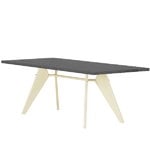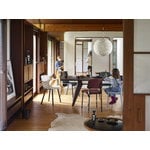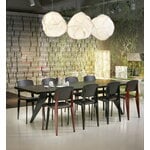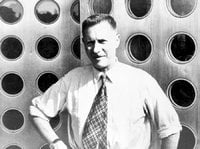Vitra’s EM Table is a streamlined table which was designed by the French engineer and designer Jean Prouvé for the modernist, prefabricated housing project La Maison Tropicale in 1950. EM Table’s powder-coated steel frame and diagonal legs adhere to the structural principles of architecture and engineering. The simple, rectangular tabletop is available in solid wood or laminate. EM Table is a timeless classic as a dining or conference table, and its shape and colours match seamlessly with Prouvé’s Standard chairs.



EM Table 240 x 90 cm, asphalt - Prouvé Blanc Colombe
Vitra
Description
Vitra’s EM Table is a streamlined table which was designed by the French engineer and designer Jean Prouvé for the modernist, prefabricated housing project La Maison Tropicale in 1950. EM Table’s powder-coated steel frame and diagonal legs adhere to the structural principles of architecture and engineering. The simple, rectangular tabletop is available in solid wood or laminate. EM Table is a timeless classic as a dining or conference table, and its shape and colours match seamlessly with Prouvé’s Standard chairs.
Product details (6)
- Colour
- Dark grey, beige
- Length
- 240 cm
- Width
- 90 cm
- Height
- 74 cm
- Table top material
- 40 mm high pressure laminate
- Frame material
- Bent steal with powder coated finish
- Product ID
Designer
Jean Prouvé (1909–1984) was a French metal artisan, engineer and self-taught architect and designer, who had a great influence on European post-war design and design philosophy. Social conscience and easy accessibility were essential starting points for Prouvé’s designs, which were often based on prefabricated housing, modular systems and mass-production.
Read moreReviews (0)
Sustainability
The Product Sustainability Framework, our criteria of sustainable design, helps you find the most sustainable products in our selection. Read below which sustainability criteria this product has met.
Working conditions & labour 7/9
-
Equal opportunities for all employees
-
Commitment to UN Global Compact, fair compensation for all employees
-
Corporate responsibility requirements defined and communicated for suppliers
-
Systematic work for improved inclusion and well-being in the workplace
-
Transparent supply chain
-
Suppliers' compliance to a code of conduct ensured
-
Compliance to the UN Guiding Principles on Business and Human Rights ensured in the supply chain
Eco-friendly production 7/9
-
Fair and resource-wise water-use in production
-
No incineration or landfilling of returned items
-
No use of endangered species as materials
-
No direct environmental emissions or waste (excl. GHGs) from production
-
Production and material sourcing that respect biodiversity, animal rights, and natural ecosystems
-
Material-efficient and ecological packaging
-
No potentially harmful chemicals used in own production
Climate impact 5/8
-
Company's direct greenhouse gas emissions identified and commitment to reduction
-
Product's carbon impact identified and commitment to reduction
-
Guidance on energy- and eco-efficient use of the product
-
Contribution to climate initiatives beyond the brand’s direct operations
-
100 % renewable energy in own production and operations
Sustainable materials 5/6
-
Sustainable and long-lasting material choices
-
No harmful or hazardous substances
-
Responsible raw material sourcing and production
-
Materials suited for circularity: monomaterials, recyclable finishings, renewable or recycled contents etc.
-
Ecological materials: natural, biodegradable, recyclable or recycled contents
Circular design 5/5
-
High aesthetic quality promoting long-term use of the product
-
Technically durable product design and material choices
-
Design for enduring life-long quality
-
Design and support for product maintenance, repair and upgradability
-
Innovative circular design solutions: circular service system, resale platform, remanufacturing, collection of used products, etc.







